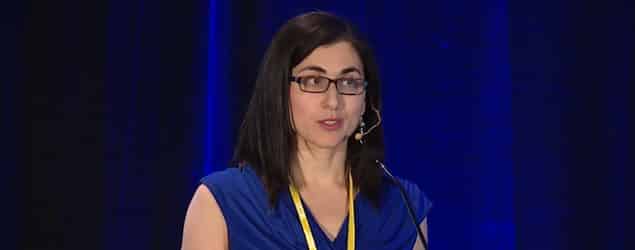What Does Objectivism Have to Say About National Security Intelligence?

Tara Smith, professor of philosophy at the University of Texas – Austin, recently addressed an audience of approximately two hundred and fifty members of the intelligence community, imparting an Objectivist perspective on the nature and value of objectivity as a safeguard against politicized or biased military intelligence.
The symposium on analytic objectivity took place on August 24, 2017, at the Mark Center in Alexandria, Virginia, and was hosted by the office of the Under Secretary of Defense for Intelligence. That office, which is part of the U.S. Department of Defense, acts as the principal civilian advisor to the Secretary of Defense on matters relating to military intelligence. Attendees included professionals from such branches of the intelligence community as the Central Intelligence Agency, the National Security Agency and the Department of Defense.
“I knew nothing about the symposium until the under secretary’s office emailed me out of the blue,” Smith recalled. “A few people in their office had evidently read my book on objectivity in law [Judicial Review in an Objective Legal System], and they thought I could contribute to the symposium’s goal of examining objectivity from points of view outside of the military and intelligence worlds. Of course, I have no experience in defense or intelligence work, but in a few subsequent phone conversations, they made clear that they deliberately sought people like me who work in completely different fields.
“The push behind the symposium was the desire to ensure non-politicized, non-biased intelligence, not ‘what the boss wants to hear.’ I think it’s a real credit to them that they held this kind of event. And in the day’s discussion, I was able to bring in a sane view of objectivity — which is widely misunderstood, in my view,” Smith said.
The symposium’s keynote speaker was Bob Woodward, the author and Washington Post reporter of Watergate fame, who was followed by three general-session panels, each featuring three speakers. “I was on the first panel,” said Smith, “and I was glad to be able to plant a few important ideas that other panelists later in the day referred back to.
“Panelists had only a few minutes for their opening remarks, so I focused mine on the question: Why should we even care about objectivity? What’s the payoff? I made a pretty clear connection to values, what’s at stake. And I observed that contrary to conventional wisdom, objectivity is possible, and so we shouldn’t go around repeating the self-defeating mantra that nobody can be objective.”
Also on Smith’s panel were Murray “Jay” Farr, chief of police for Arlington County, Virginia, and Seth Feuerstein, a psychiatrist who teaches at Yale University. Other panelists work in the fields of medicine, academia, marketing, manufacturing (automobiles and pharmaceuticals) and intelligence. Smith enjoyed hearing all of their perspectives and was impressed by the convergence of conviction — although not always expressed in so many words — that there is no faking reality, and attempts to do that invariably explode.
“I really enjoy speaking to non-academic audiences,” she remarked. “And I’ve come to think that there may be two keys to being effective with such groups: essentials and examples. Participating in this symposium, I more clearly identified those two in my own mind. Nail the essentials, give the audience clear takeaways, and use recognizable examples where the issue under discussion, however abstract, arises in ways that are important for them.”
More to explore by Tara Smith:



